The Role of AI in Modern SEO Strategies
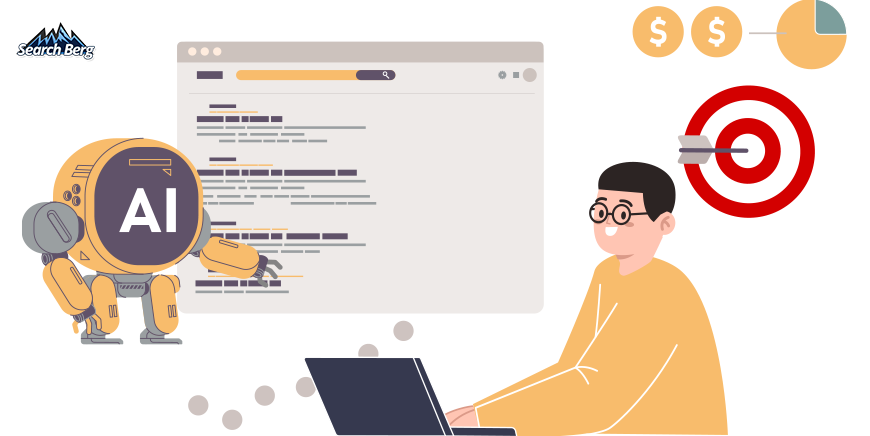
In 2024, your website’s ranking is more important than your business card. Without good, in fact, great SEO, your business is like a hidden gem in a dark cave; no one’s going to find it.
But SEO is a beast, constantly evolving, always hungry for new tactics and strategies. And now, AI is throwing a whole new flavor into the mix.
Why should you care? Because AI isn’t just changing the SEO game, it’s rewriting the rulebook. It’s like Google decided to play chess instead of checkers, and the stakes are higher than ever.
Ignore this shift at your own peril. Businesses that embrace AI-powered SEO will have a significant advantage over those that don’t. They’ll be able to understand their audience better, create more relevant content, and drive more traffic to their websites.
In this blog, we’re bringing the role of AI in SEO to your doorstep. Understand how AI is shaking up search engine optimization services and what this means for your business. We’ll also show you the smart way to benefit from the AI-SEO partnership.
Are you with us?
1. AI’s Expanding Influence on SEO
From self-driving cars to medical diagnoses, artificial intelligence has been leaving its mark on industry after industry. It was only a matter of time before this technological tsunami reached the shores of SEO. After all, search engines are powered by complex algorithms, and AI excels at crunching data and finding patterns.
AI in SEOis fundamentally changing how we understand and approach optimization. It’s giving us unprecedented insights into user behavior, predicting trends with uncanny accuracy, and even generating high-quality content that rivals human creativity.
The old SEO playbook is becoming obsolete, and businesses that don’t adapt risk being left behind in the digital dust. This is a new era of SEO, powered by AI, and those who embrace it will reap the golden rewards.
What are the key areas where AI in SEOis making an impact?
Let’s look closer.
1.1. Keyword Research
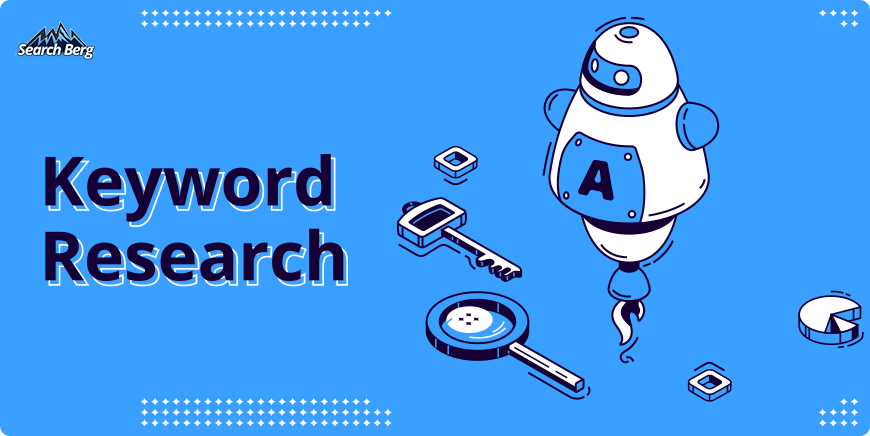
To most businesses, keyword research isn’t exactly the most thrilling part of SEO. Traditionally, it’s been a tedious, manual process, kind of like finding a needle in a haystack. AI is about to turn this snooze-fest into a strategic goldmine (and it already has).
AI-powered keyword research tools are faster, smarter, and more efficient. They don’t just spit out a list of high-volume keywords; they dive deep into the data, revealing hidden gems that you may have missed.
Let’s say you’re a small business selling organic dog treats. A traditional keyword tool may suggest obvious terms like “dog treats” or “organic dog food.” But an AI-powered tool, like Search Berg’s in-house tool which plays a critical part in search engine optimization services, could unearth a treasure trove of long-tail keywords like “best organic dog treats for sensitive stomachs” or “grain-free dog treats for puppies.” These niche keywords may have lower search volumes, but they’re gold for attracting highly targeted traffic, i.e., customers who are actively searching for exactly what you offer.
AI doesn’t stop there. It’s like having a crystal ball that can predict future trends. By analyzing vast amounts of data, AI in SEO can forecast which keywords are likely to gain traction in the coming months or years. This can help you get a head start on your competition, creating content that aligns with emerging search trends before they even hit the mainstream.
But perhaps the most significant advantage of AI in SEO keyword research is its ability to understand the intent behind a search query. Traditional keyword tools often focus on matching exact keywords, but AI digs deeper. It analyzes the context of the search, the user’s location, device, and even their search history to gain a more nuanced understanding of what they’re really looking for.
For instance, a search for “apple” could mean a variety of things: the fruit, the tech company, or even a recipe for apple pie. AI can differentiate between these different intents, ensuring that your content is served to the right audience at the right time.
A travel agency may use an AI-powered tool to analyze search trends around a particular destination. The tool could reveal that users aren’t just searching for “flights to Hawaii,” but also for “family-friendly activities in Hawaii,” “best snorkeling spots in Hawaii,” or “romantic restaurants in Maui.” Armed with this information, the travel agency can create targeted content that addresses these specific interests, increasing their chances of attracting and converting potential customers.
See what we mean?
While AI is a powerful ally in the keyword research process, it’s not a substitute for human expertise. Think of it this way: AI is a microscope, capable of magnifying minute details and revealing hidden patterns, but it still needs a skilled scientist to interpret those findings and draw meaningful conclusions.
At Search Berg, we believe that AI-powered keyword research tools are only as good as the human guiding them. As part of our professional SEO services, we bring a wealth of experience and industry knowledge to the table, ensuring that the keywords we target not only align with search trends but also resonate with your specific audience.
AI may excel at identifying high-volume search terms, but it can sometimes miss the nuances of language and context. For instance, it may suggest technically relevant keywords but don’t align with your brand voice or target audience’s interests. Our experts can quickly identify these discrepancies and ensure that your keyword strategy is data-driven and strategically aligns with your overall business objectives.
Think of it as a partnership: AI provides the raw data and insights, while our team of SEO experts acts as the filter, the interpreter, and the strategist. We harness the power of AI to tap into hidden opportunities and emerging trends, then apply our expertise to craft a keyword strategy that’s tailored to your unique needs and goals.
The result? Power-packed keyword research that helps businesses claim the top Google SERP rankings.
Recommended Read: Introducing Search GPT: OpenAI’s New AI-Powered Search Prototype
1.2. Content Optimization
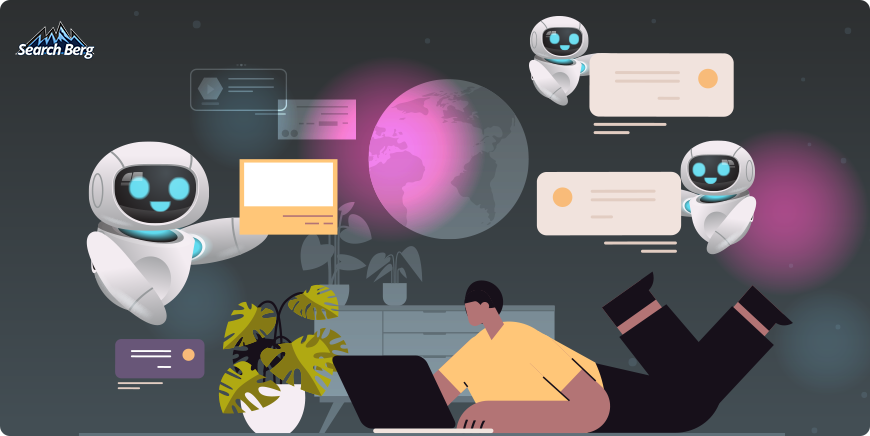
Creating high-quality content can feel like an uphill battle. You need to find the right topics, strike the right tone, and sprinkle in the right keywords, all while ensuring your content is engaging, informative, and original. It isn’t quite everyone’s cup of tea.
The days of staring at a blank screen, waiting for inspiration to strike? Long gone. AI-powered content optimization tools are like having a trusty sidekick, always ready with a suggestion or two (or twenty). These tools can analyze your content and offer actionable insights to make it even better.
For example, AI can help you optimize your headlines. It can analyze your existing headlines and suggest alternatives that are more likely to grab attention and drive clicks. Some tools even use natural language processing to generate multiple headline options, allowing you to choose the one that best fits your brand voice and target audience.
AI can also help you improve the readability of your content. By analyzing sentence structure, word choice, and overall flow, AI can identify areas where your content could be more concise or easier to understand. This is particularly important for complex topics, where you need to strike a balance between providing detailed information and keeping your readers engaged.
But AI doesn’t stop at the surface level. It can also help you optimize your content for search engines. By analyzing the top-ranking pages for your target keywords, AI can identify patterns and suggest optimizations that could help your content rank higher. This may include adding relevant keywords, optimizing your meta descriptions, or even restructuring your content to better align with search engine algorithms.
All fun and games? Well… not quite.
Google’s recent algorithm updates, including the March 2024 update, have cracked down on unhelpful content, regardless of whether it’s AI-generated or not. And let’s face it, a lot of AI-generated content can be, well, a little soulless. It may be grammatically correct and keyword-rich, but it often lacks the spark, the personality, and the human touch that truly resonates with readers.
This is where the misconception lies. AI isn’t a replacement for human creativity; it’s a tool to enhance it. Think of AI as a sous chef, diligently chopping vegetables, measuring ingredients, and prepping the kitchen. But it’s the head chef, the human, who brings the vision, the flavor, and the artistic flair that transforms those ingredients into a culinary masterpiece.
That’s why, at Search Berg, we use AI in SEO strategically. We make full use of our power to streamline our processes and gain valuable insights, but we never rely on it to do the heavy lifting of content creation. Our team of experienced writers and SEO specialists use AI as a tool, not a crutch. We use it to inform our strategies, guide our keyword choices, and optimize our content for search engines. But the heart and soul of our content comes from our human team.
Before you hand over critical content tasks to AI, think about what your audience wants: helpful, high-quality content that answers their questions, keeps them engaged, and prompts them to make a purchase (let’s not beat around the bush; revenue is one of the primary goals). This is a tall order and one that absolutely requires humans. When you combine expert SEO services with AI prowess, you’re in for a spectacular show that leaves everyone in awe.
1.3. Technical SEO
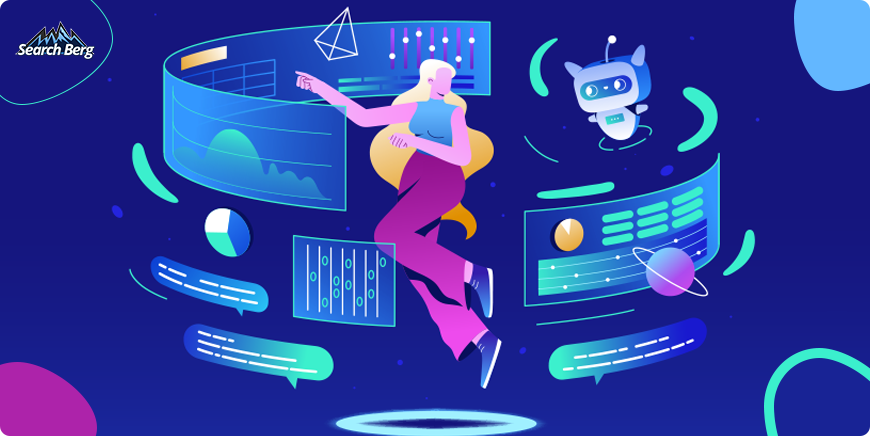
Technical SEO isn’t exactly the most appealing part of digital marketing. It’s the nuts and bolts, the behind-the-scenes stuff that most people don’t even think about. While it may seem dull, technical SEO is absolutely essential if you want your website to perform like a well-oiled machine.
Think of it this way: technical SEO is like the maintenance you do on your car. You may not enjoy changing the oil or rotating the tires, but if you don’t do it, your car is going to break down. The same goes for your website. If you neglect technical SEO, your site is going to sputter, crawl, and fail to reach its full potential.
AI in SEO is a game-changer here. AI-powered tools can crawl your site, identify technical issues, and even suggest fixes… all without you having to lift a finger.
Here are just a few ways AI is making technical SEO a whole lot easier:
- Automated Website Audits: Forget about manually combing through your site for errors. AI-SEO tools can do it in a fraction of the time, spotting broken links, duplicate content, and other issues that can hurt your rankings. This is where AI in SEO proves invaluable.
- Site Speed Optimization: We all know how frustrating it is to wait for a slow website to load. AI can analyze your site’s code and identify bottlenecks, helping you shave precious seconds off your load time.
- Mobile Optimization: With more and more people using their phones to browse the web, mobile optimization is non-negotiable. AI can help you ensure your site looks and functions flawlessly on any device.
- Structured Data Implementation: This is the technical mumbo-jumbo that helps search engines understand your content. AI can automate the process, making it a breeze to add structured data to your site.
- Image Optimization: Large image files can slow down your site like molasses. AI can compress your images without sacrificing quality, ensuring your pages load lightning fast.
Impressive, right? But before you start thinking that AI is the be-all and end-all of technical SEO, let’s clarify something: AI is a tool, not a replacement for human expertise.
While AI can certainly make technical SEO easier and more efficient, it’s not perfect. It can’t always understand the nuances of your specific situation or make judgment calls based on your business goals. Like with keyword research and content optimization, you still need human experts for masterful technical SEO.
At Search Berg, we use AI to streamline our technical SEO processes, but we also rely on our team of seasoned professionals to interpret the data, make strategic decisions, and implement solutions that deliver real results.We offer expert SEO services that blend the best of AI and human insight.
1.4. Link Building
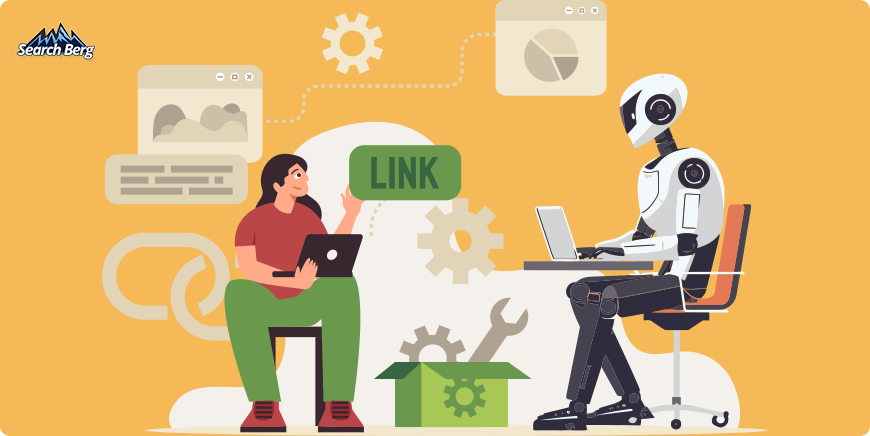
Link building, in the context of SEO, is the process of acquiring hyperlinks from other websites to your own. These hyperlinks, often referred to as backlinks, are essentially votes of confidence from one website to another. Search engines like Google view these backlinks as a signal of your website’s authority and relevance, which can significantly impact your search rankings.
In simpler terms, link building is like getting other websites to recommend your content to their audience. The more reputable and relevant the website linking to you, the more valuable the backlink is for your SEO. This is because search engines see these links as endorsements, indicating that your content is trustworthy and worth ranking higher in search results.
Most businesses consider link building a time-consuming and often frustrating endeavor. The process of manually scouring the web for potential link partners, crafting personalized outreach emails, and tracking responses can feel like an endless uphill battle.
But the game is changing, and artificial intelligence is the catalyst. AI is revolutionizing the way we approach link building, making it more efficient, effective, and dare we say, even enjoyable.
AI is transforming link-building into a data-driven science. By analyzing vast amounts of data, AI-powered tools can quickly identify high-quality websites that are relevant to your niche and likely to link to your content. This eliminates the guesswork and allows you to focus your efforts on the most promising opportunities.
No more sifting through endless lists of websites, hoping to find a few that might be interested in your content. AI does the heavy lifting, saving you valuable time and resources.
But AI doesn’t stop at identifying potential link partners. It can also analyze your existing content and suggest topics that are likely to resonate with your target audience. This helps you create link-worthy content that other websites will be eager to share with their readers. It’s like having a personal content strategist who understands your audience and knows what kind of content will grab their attention.
One of the most exciting applications of AI in link building is predictive analytics. By analyzing historical data and patterns, AI can forecast which link-building strategies are most likely to succeed for your specific website and industry. This helps you make informed decisions and invest your resources in the most impactful initiatives. Forget about relying on gut feelings or outdated tactics; AI provides you with data-backed insights that can significantly improve your link building success rate.
AI can also automate many of the repetitive tasks associated with link building, e.g., sending outreach emails, tracking responses, and even personalizing messages. This frees up your time to focus on building relationships with potential link partners and creating valuable content that will attract backlinks naturally.
By automating these mundane tasks, AI allows you to scale your link building efforts without sacrificing quality or personalization.
Can we count humans out? You guessed it: no.
Here’s why:
- The Art of Persuasion: AI can help you craft compelling outreach emails, but it can’t replicate the persuasive power of a human connection. Building relationships with website owners and bloggers requires genuine interaction, understanding their needs, and tailoring your pitch to their specific interests.
- Quality Control: AI can identify potential link partners, but it can’t always assess the quality or relevance of those websites. A human touch is needed to evaluate the authority, trustworthiness, and niche relevance of potential link sources.
- Creativity and Strategy: AI can provide data-driven insights, but it can’t replace the creative thinking and strategic planning that goes into a successful link building campaign. A human expert can develop innovative strategies, identify unique opportunities, and adapt to the ever-changing landscape of SEO.
- Relationship Building: Link building isn’t just about getting links; it’s about building relationships. AI can’t replicate the human touch that’s essential for fostering long-term partnerships and establishing your brand as a trusted authority in your industry.
While AI is undoubtedly a valuable tool in the link building toolkit, it’s important to remember that it’s just that: a tool. The most successful link building campaigns are those that leverage the power of AI while also embracing the human element. By combining data-driven insights with creativity, relationship building, and strategic thinking, you can create a link building strategy that delivers results.
1.5. Local SEO

Let’s say you craving pizza. Not just any pizza, but a piping hot, cheesy slice from a local pizzeria, delivered right to your doorstep. You whip out your phone and type, “pizza delivery near me.” Within seconds, Google serves up a list of nearby pizzerias, their ratings, and even estimated delivery times.
Seems like magic, right? Well, it’s not magic; it’s AI at work, transforming the way we find and interact with local businesses.
For local businesses, this isn’t just a cool tech trend; it’s a seismic shift in how they attract and retain customers. Local SEO, once a relatively straightforward game of optimizing your website and Google Business Profile (formerly known as Google My Business) listing, is now being supercharged by AI in SEO. You can’t just establish an online presence and call it a day.You need to be relevant and personalized to win in the local search game.
This is where AI steps in, wielding its data-crunching prowess to make local SEO more intelligent and impactful:
- Hyper-Personalized Search Results: AI is turning search engines into mind readers, in a way. It is now capable of delivering a highly personalized search experience, tailored to your unique preferences and context.
Imagine searching for “restaurants near me” and seeing results that not only factor in your current location, but also your past dining habits, cuisine preferences, and even the time of day.
Craving Italian food on a Friday night? AI may suggest a cozy trattoria with live music. Looking for a quick lunch on a workday? It may prioritize fast-casual options with high ratings for speedy service.
This level of personalization ensures that you’re not just seeing any old search results, but options that genuinely appeal to you, increasing the likelihood of engagement and conversion.
- Optimized Local Business Listings: AI can help make your Google Business Profile (GBP) listing the most attractive one on the block. AI-powered tools can audit your GBP listing, flagging inconsistencies, missing information, or outdated photos. They can even analyze your competitors’ listings to identify areas where you can outshine them.
Want to know which keywords your competitors are ranking for? AI can tell you. Need suggestions for improving your business description or adding more compelling photos? AI’s got your back. It’s like having a dedicated marketing team working tirelessly to ensure your GBP listing is always optimized and ready to attract customers.
- Review Management: Online reviews are the modern-day word-of-mouth, and AI is here to help you manage them like a pro.
AI-powered tools can monitor your online reviews across multiple platforms, flagging negative feedback so you can address it promptly. AI can also analyze sentiment, identifying positive reviews that you can showcase on your website or social media.
Some tools even go a step further, using AI and SEOto generate personalized responses to customer feedback, saving you time and ensuring that your customers feel heard and valued.
- Local Content Creation: Creating relevant, engaging content is essential for any local SEO strategy. But how do you know what topics will resonate with your audience?
AI can help.
By analyzing local search trends and user behavior, AI-powered tools can suggest topics, keywords, and even content formats that are likely to pique the interest of your local community.
For instance, if you run a local bookstore, AI may suggest writing a blog about upcoming author events in your area or creating a video tour of your store. This targeted approach to content creation ensures that you’re not just creating noise; you’re providing valuable information that your audience is actively seeking.
Want to make the most of AI for local SEO success? Consider partnering with a professional SEO agency like Search Berg. We specialize in AI SEO optimization and offer a range of SEO services tailored to local businesses.
Recommended Read: How to Optimize and Promote Your Google Business Profile
1.6. Analytics and Reporting
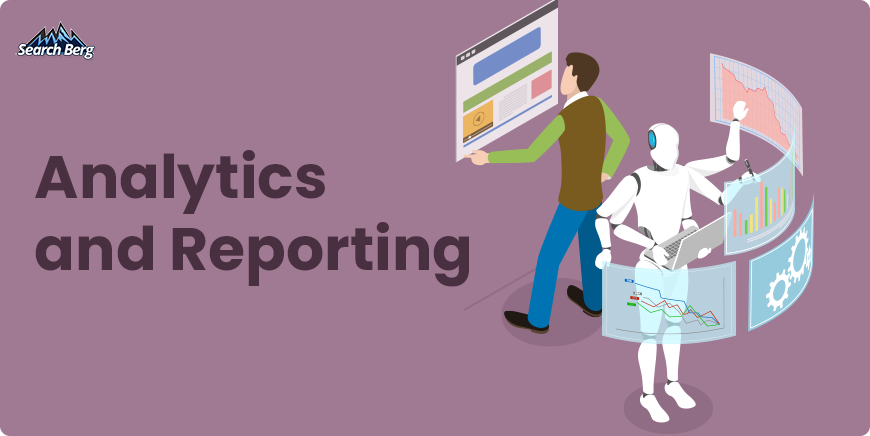
When it comes to SEO, data is king; there are no two ways about it. It’s the fuel that powers your decisions, the yardstick by which you measure your success. But let’s face it, data can also be a bit of a beast. It’s vast, complex, and constantly changing. Analyzing it can feel like trying to decipher a foreign language without a dictionary.
AI possesses the incredible ability to translate complex metrics into actionable insights. AI-powered analytics tools are revolutionizing the way we track, measure, and interpret SEO data, making it easier than ever to understand what’s working, what’s not, and where to focus your efforts.
AI in SEO is changing the game of analytics and reporting.
Let’s break it down:
- Automated Data Collection: AI can automatically collect data from various sources, including your website, search engines, social media, and even your competitors’ websites. This saves you countless hours of manual data gathering, freeing up your time for more strategic tasks.
- Data Cleaning and Processing: Raw data is often messy and unstructured. AI can clean and process this data, removing errors, inconsistencies, and outliers, ensuring that your analysis is based on accurate and reliable information.
- Pattern Recognition: AI algorithms are adept at identifying patterns and trends in data that may not be immediately obvious to the human eye. This can help you tap into hidden opportunities, predict future trends, and make data-driven decisions that drive results.
- Predictive Analytics: AI can use historical data to predict future outcomes, e.g., which keywords are likely to drive the most traffic or which content topics are likely to resonate with your audience. This helps you proactively optimize your SEO strategy and stay ahead of the curve.
- Personalized Reporting: AI can generate customized reports that are tailored to your specific needs and interests. This means you get the information that matters most to you, presented in a way that’s easy to understand and act upon.
- Anomaly Detection: AI can quickly identify unusual patterns or anomalies in your data, e.g., a sudden drop in traffic or a spike in bounce rate. This allows you to quickly investigate and address any potential issues before they escalate.
At Search Berg, we don’t just dabble in AI; we immerse ourselves in it.
We leverage AI’s predictive capabilities to forecast future trends, giving you a competitive edge. Our AI algorithms analyze historical data and identify patterns, allowing us to anticipate changes in search behavior and algorithm updates before they happen. This means we can proactively adjust your SEO strategies to ensure you’re always on top of your game.
1.7. Voice Search
Remember the days when search queries were short, keyword-stuffed phrases typed into a search bar? Those days are fading fast.
Thanks to the rise of voice-activated devices like smartphones, smart speakers, and virtual assistants, people are increasingly searching the internet using their voices. This shift towards conversational search is a fundamental change in how we interact with technology, and it’s having a profound impact on SEO strategies.
Artificial intelligence (AI) is at the heart of this change in professional search engine optimization services. AI has enabled voice search to evolve from a novelty to a mainstream phenomenon. Natural Language Processing (NLP) and machine learning algorithms allow AI to understand and interpret spoken language with remarkable accuracy. AI can now understand intent, context, and even the nuances of human speech.
This conversational shift in search behavior has major implications for SEO. Traditional keyword-focused strategies are no longer sufficient. Voice searches tend to be longer, more conversational, and often phrased as questions.
For example, instead of typing “best Italian restaurant near me,” someone may ask their voice assistant, “Hey Siri, where’s a good Italian restaurant nearby that has outdoor seating?”
To optimize for voice search, you need to understand how people talk, not just how they type. This means focusing on long-tail keywords, natural language phrases, and question-based queries. It also means providing clear, concise answers to those questions in your content, using a conversational tone that’s easy for voice assistants to understand and convey.
AI is also playing a vital role in improving the accuracy and relevance of voice search results. By analyzing vast amounts of data, including user search history, location, and device type, AI can deliver personalized results that are tailored to each individual’s needs and preferences.
This means that when someone searches for “pizza delivery near me,” they’re more likely to see results from pizzerias that are not only close by, but also match their dietary preferences and past order history.
In addition to improving search results, AI is also making voice search more interactive and engaging. Voice assistants are becoming increasingly sophisticated, capable of holding conversations, cracking jokes, and even providing emotional support. This creates new opportunities for businesses to connect with their audience on a more personal level.
Recommended Read: How to Optimize Google Business Profile for Voice Search
2. Can My Small Business Benefit from the AI-SEO Fusion?
Absolutely! In fact, small and medium-sized businesses (SMBs) might stand to gain the most from the AI-SEO alliance.
Why?
Because AI levels the playing field, giving you tools and insights that were once only accessible to large corporations with deep pockets.
Think about it: AI-powered SEO tools can automate many of the tasks that used to require a team of experts. This means you can compete with the big boys without breaking the bank.
Here’s how AI can specifically benefit your SMB:
- Cost-Effectiveness: While AI-powered SEO tools can be expensive, many digital marketing agencies invest in these tools and offer their services at affordable rates. This gives you access to sophisticated technology and expert insights without the hefty price tag. It’s a win-win situation for SMBs looking to maximize their SEO impact without breaking the bank.
At Search Berg, we use our own tools and invest in efficient, trusted, third-party tools to give you the mightiest AI-SEO punch.
- Efficiency: AI automates tedious tasks like keyword research, content optimization, and technical audits, freeing up your time to focus on other aspects of your business.
- Competitive Advantage: By leveraging AI, you can gain insights into your competitors’ strategies, identify untapped opportunities, and create content that outperforms theirs.
- Personalized Customer Experience: AI can help you understand your audience better, allowing you to tailor your content and marketing messages to their specific needs and interests.
- Improved Decision-Making: AI-powered analytics provide valuable insights into your website’s performance, helping you make data-driven decisions that drive results.
AI isn’t a threat; it’s a game-changer for businesses looking to climb Google’s tempting ranks. When you sign up for the right search engine optimization services, you’re looking at a steady path of roaring online success. And yes, AI, when leveraged correctly, plays a big hand in clearing this path for you.
3. Future Trends: AI and SEO
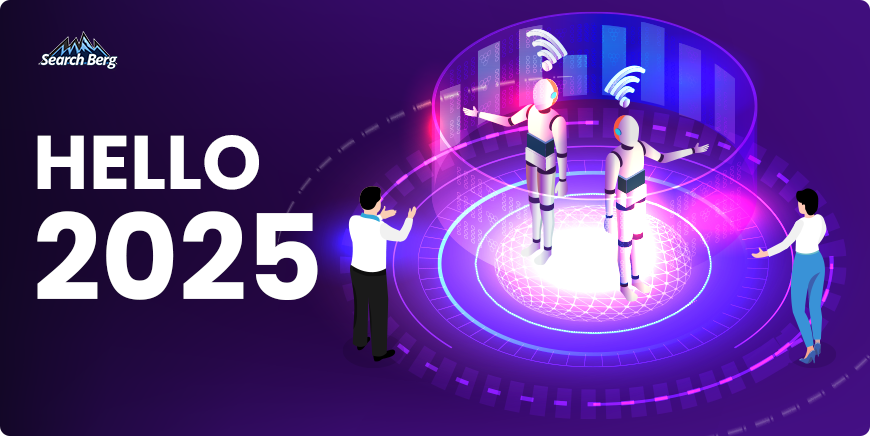
By now, you’ve gotten a taste of how AI is already shaking up the SEO scene, but this is just the tip of the iceberg. AI is evolving at breakneck speed, and its impact on SEO is only going to amplify in the years to come.
3.1. The Rise of Truly Predictive SEO
Today, AI can analyze past data to inform current strategies. In the coming years, AI will start going beyond that. We’re talking about predictive models that anticipate algorithm changes, emerging search trends, and even shifts in consumer behavior.
Imagine an AI tool that alerts you to a potential algorithm update weeks before it happens, giving you ample time to adjust your strategy and avoid a rankings nosedive. Or picture an AI tool that analyzes social media conversations and news articles to predict which topics will be trending next month, allowing you to create timely and relevant content that captures the zeitgeist.
AI and SEO together will enable businesses to stand out, dominate, and sell in a way we’ve never seen before.
3.2. Visual Search
We’re already living in a world where AI-driven image tools like DALL-E 2, Midjourney, and Stable Diffusion can conjure up photo realistic images from mere text descriptions. These tools have captured the imaginations of artists and designers. They’ve also opened doors for businesses to create eye-catching visuals for their marketing campaigns.
But the AI SEO revolution in visual search is far from over. We’re standing on the precipice of even more groundbreaking advancements that will redefine how we interact with and discover visual content online.
Imagine a world where search engines can truly understand the context and meaning behind an image or video, not just its surface-level features. This will enable users to search for images based on specific emotions, concepts, or even abstract ideas. For instance, you could search for “images that convey a sense of tranquility” or “videos that inspire creativity.”
AI will also enable search engines to recognize objects and scenes within images and videos, allowing for more precise and relevant search results. For example, if you’re searching for a specific model of a car, AI could identify that car in a video or a crowded street scene and present you with relevant results.
This enhanced understanding of visual content will have a profound impact on SEO. Businesses will need to optimize their visual content not just for keywords, but also for the underlying emotions, concepts, and context that AI algorithms can now recognize.
This means going beyond traditional image optimization techniques (like alt text and file names) and moving towards creating visual content that tells a story, evokes emotions, and aligns with your brand identity. By using AI-powered tools, you’ll be able to analyze the visual elements of your content and ensure that they’re sending the right signals to search engines.
In this new era of visual search, creativity and strategy will go hand-in-hand. The businesses that can harness the power of AI and SEO to create visually compelling and semantically rich content will be the ones that stand out from the crowd and capture the attention of their audience.
3.3. Hyper-Personalization
The days of generic search results are numbered. AI is pushing personalization into uncharted territory, creating search experiences so tailored, that it’ll feel like Google’s reading your mind (well, almost).
We’re talking about search results that factor in not just your location and past searches, but also your interests, preferences, and even your current emotional state.
Imagine searching for “vacation ideas” and seeing results that reflect your love for adventure travel, your budget constraints, and even whether you’re feeling stressed and need a relaxing getaway or energized and ready for an action-packed trip. This level of granularity will make search results incredibly relevant, ensuring that users find exactly what they’re looking for, every time.
For businesses, this hyper-personalization presents both a challenge and an opportunity. On the one hand, it means that the days of casting a wide net with generic content are over. On the other hand, it opens up a world of possibilities for connecting with your target audience on a deeper level.
AI-powered tools will become indispensable in search engine optimization services for analyzing user behavior and predicting search intent with laser precision. They’ll help you understand what your audience is searching for, why they’re searching for it, and what they’re hoping to find. Armed with these insights, you can create content that speaks directly to their needs, desires, and pain points, fostering a deeper connection and increasing the likelihood of conversion.
Exciting? Very. But all this is not without its pitfalls.
AI can be a powerful tool, but it’s essential to use it ethically and responsibly.Google’s algorithms are constantly evolving to detect and penalize manipulative practices, often referred to as black hat SEO.
Keyword stuffing, generating low-quality content solely for the sake of ranking, or building spammy backlinks are all tactics that can trigger Google’s wrath, leading to penalties that can severely damage your website’s visibility.
Remember, AI is a tool, not a shortcut. Certain aspects of SEO, like building genuine relationships with other websites and creating high-quality, original content, are still best left to humans. AI can assist in these areas, but it can’t replace the creativity, intuition, and critical thinking that humans bring to the table.
The key is to play your cards wisely, avoid getting over-confident and greedy, and remember that Google is smarter than you may think. As long as you use AI ethically, honestly, and judiciously, you’re on the right track.
Start Winning at AI-SEO
The AI revolution isn’t just knocking on SEO’s door; it’s already kicked it down and is making itself at home. If you’re still on the fence about embracing AI in SEO, it’s time to jump off.
But here’s the catch: AI isn’t a magic wand. You can’t just sprinkle some AI fairy dust on your website and expect to rank #1 overnight. It takes strategy, expertise, and a deep understanding of how AI and SEO intersect.
That’s where we come in.
At Search Berg, we’re your AI-powered partners in digital domination. We combine cutting-edge AI SEO optimization tools with our professional SEO services to deliver results that speak for themselves. From harnessing the power of AI-driven keyword research to crafting engaging content that resonates with your audience, we’ve got you covered.
We’ve invested in cutting-edge AI systems and developed our own proprietary tools to gain an edge in the SEO jungle. Our expert SEO services are carefully crafted to keep you on the top SERPs.
If you’re ready to stop playing catch-up and start winning at SEO, let’s talk!
The Future of SEO is Here, and It's Powered by AI
Embrace it, leverage it, and watch your business soar! It all starts with a free consultation.
No spam, just expert advice!














